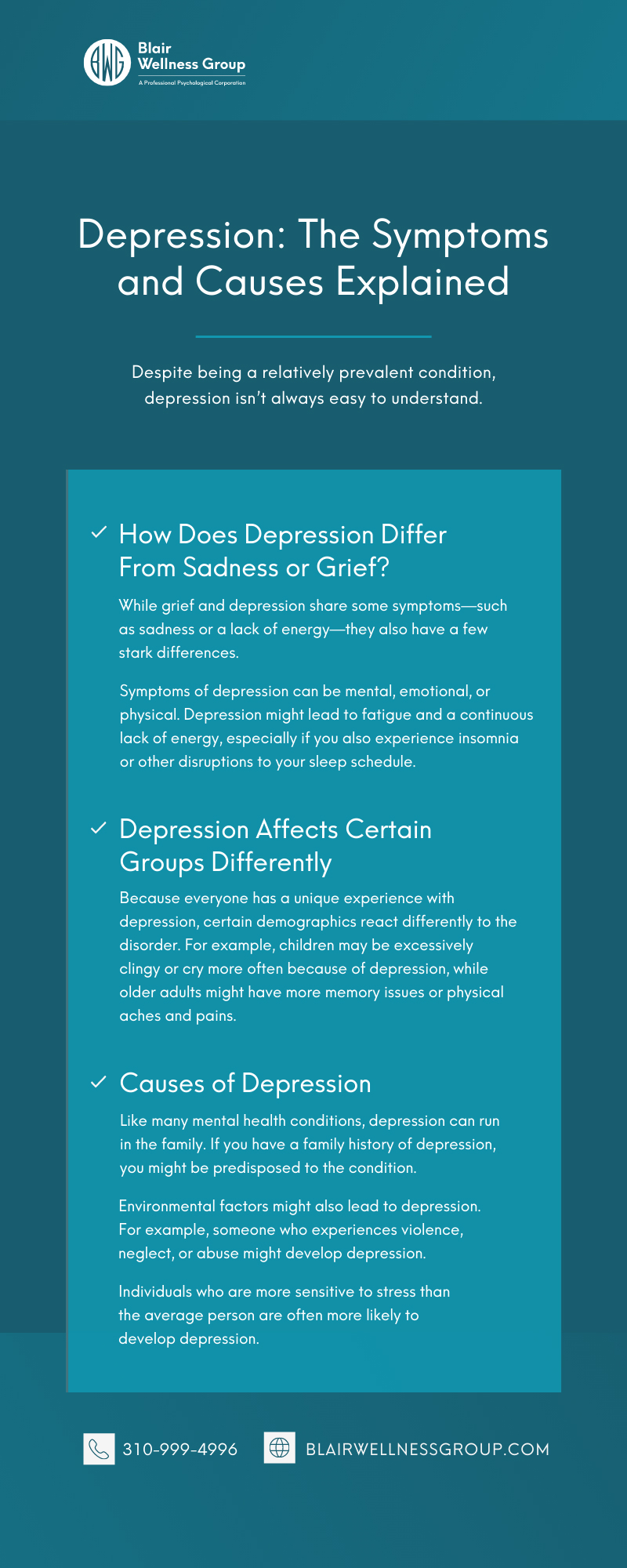Depression is an unfortunately common mood disorder that can affect every aspect of your life. There are many potential causes of depression. Symptoms of depression range from mild to severe and can be both physical and emotional.
Despite being a relatively prevalent condition, depression isn’t always easy to understand. Many adults living with Clinical Depression fail to pursue professional treatment and instead try to deny or simply cope with their symptoms to no avail. Professional mental health treatment such as Cognitive Behavioral Treatment, Psychodynamic Treatment, or Interpersonal Treatment can help you overcome your depression and fully enjoy life again.
Learn more about how depression affects lives and how treatment can help with Blair Wellness Group’s guide to depression that explains the symptoms and causes.
An Introduction to Depression
Mental health professionals categorize depression by feelings of sadness, hopelessness, and a lack of interest in things you used to enjoy. While these feelings can occur naturally in life, they become more persistent and intense when associated with depression. Unlike periods of regular sadness that you can experience in life, depression is not a condition that you can simply shake off or move on from. Depression can also lead to other severe Mental Health Disorders, physical problems, and medical issues.
This doesn’t mean those with depression should give up, however. Professional treatment can help you address the cause of your depression, overcome symptoms, and regain the joy and fulfillment you once felt in life.
How Does Depression Differ From Sadness or Grief?
Grief and other periods of sadness can be difficult, but they aren’t the same as Clinical Depression. While grief and depression share some symptoms—such as sadness or a lack of energy—they also have a few stark differences. Someone who is grieving a loved one will feel waves of both negative and positive emotions as they remember their loved one. Additionally, grief doesn’t affect feelings of self-worth. People living with depression, on the other hand, often experience feelings of self-loathing or worthlessness.
Symptoms of Depression
Everyone experiences depression differently. Various causes, reactions, and lifestyles can lead to different symptoms of depression with people experiencing varying severity and acuity in the disorder. Symptoms get worse over time as with any other untreated disorder. Knowing the most common signs of Clinical Depression can help you differentiate depression from other feelings of sadness.
Symptoms of depression can be mental, emotional, pyschological, and physical. Experiencing some or all the following symptoms may be indicative of Clinical Depression.
Mental and Emotional Symptoms
The most prevalent symptoms of Clinical Depression are feelings of sadness, hopelessness, and a lack of interest in things you once found enjoyable. However, there are other mental and emotional symptoms that come with depression.
Someone living with depression might also experience feelings of worthlessness, guilt, helplessness, irritability, and pessimism.
Difficulty concentrating and remembering things are also common symptoms of depression. Similarly, someone living with depression might struggle to make clear decisions.
Individuals with depression might also experience insomnia and feelings of restlessness. Alternatively, one might sleep excessively as a result of depression or unable to fall asleep or stay asleep.
Physical Symptoms
Many common symptoms of depression are physical. Persistent pain can manifest as a result of untreated Clinical Depression. Headaches, Migraines, and body aches are common. You might also experience cramps or digestive issues. These aches and pains are usually unexplainable and don’t go away with normal treatments until you seek treatment from a Licensed Clinical Psychologist.
Depression might also lead to fatigue and a continuous lack of energy, especially if you also experience insomnia or other disruptions to your sleep schedule.
Depression Affects Certain Groups Differently
Because everyone has a unique experience with depression, certain demographics react differently to the disorder. For example, children may be excessively clingy or cry more often because of depression, while older adults might have more memory issues, irritability, low frustration tolerance, mood swings, fatigue, physical aches and pains.
Generally speaking, men who live with depression are more likely to experience more aggressive symptoms. Men with depression might have trouble controlling their anger or become more controlling in their relationships. Men are also more likely to develop an alcohol addiction as a result of depression. Other symptoms men commonly face include avoiding social situations and struggling to keep up with personal and professional responsibilities.
Causes of Depression
Anyone can experience depression regardless of their family history, demographic, and life experience. However, there are a few common factors that can play a role in the development of depression.
Like many mental health conditions, depression can run in the family. If you have a family history of depression, you might be predisposed to this Mental Health condition among other disorders.
Environmental factors might also lead to depression. For example, someone who experiences violence, neglect, or abuse might develop depression. Factors such as poverty can also lead to depression. Major life events such as divorce, a serious medical diagnosis, or the loss of a loved one might also cause depression.
Another potential cause of depression is personality. Individuals who are more sensitive to stress than the average person are often more likely to develop depression. Similarly, individuals with low self-esteem are also at a higher risk.
Associated Risks
Depression can lead to the development of other mental and physical health issues. Attempts to live with depression or cope on your own can lead to maladaptive behaviors like substance abuse or self-inflicted harm such as suicide. Untreated depression can cause additional issues like Addiction Disorders and other Mental Health Disorders. Severe depression might also lead to isolation or suicidal ideations or suicide.
Various physical conditions can also accompany severe depression. For example, obesity can stem from overeating or other disruptive eating habits that start as a symptom of depression. Sleep disorders, heart disease, and stroke can also occur because of severe depression.
Seeking professional treatment can help you navigate your depression and prevent or treat these accompanying risks.
Finding Professional Treatment for Your Depression
Understanding the symptoms and causes of depression is the first step to acknowledging your condition and finding the help you deserve. If you’re experiencing depression and its symptoms, Blair Wellness Group is here to help. We offer compassionate and confidential service—including evening and weekend appointments for our Concierge patients—so that you can heal from your depression and move forward with your life. Find effective treatments from an experienced depression psychologist at Blair Wellness Group.
















